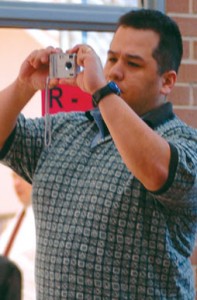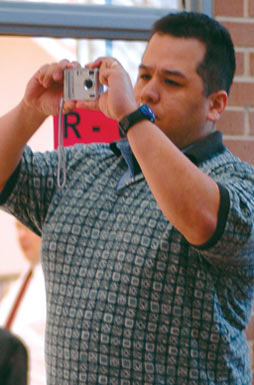By John Garces/sports editor

Chaos and confusion reigned when the Tarrant County Democratic Party held its district convention on SE Campus March 29, and one TCC student, appointed to serve as a delegate for Hillary Clinton, got the chance to be a part of it all.
Pax Salinas, a NE student, was appointed a delegate at the Democratic caucuses March 4.
“I early voted, so the only reason I went on Election Day was to caucus. I had been getting messages telling me to caucus,” he said.
As with most other places statewide, long lines created headaches and stirred emotions between the Clinton and Barack Obama supporters.
“Once the caucus started, the longest process was verifying everybody. There were nine delegates for Clinton and six delegates for Obama,” he said.
Everyone who has ever seen a political convention on TV knows what goes on there, but it is at the lower levels of these party meetings, where most of the planning is done.
“The district convention is where everybody from the county goes after they are appointed delegates,” he said, “They set an agenda for the party and elect delegates to send to the state convention [in Austin]. From there, the delegates go to the national convention in Denver.”
The district convention, though, was not free of controversy.
“It was like the caucuses, except on a bigger scale,” he said, “Nobody knew what was going on.”
Additionally, it took six or seven hours for the actual convention process to get started, and a lot of potential delegates were frustrated when told their voting information had been lost, Salinas said.
The convention provided a chance for delegates to try to settle any voting issues left over from the primary.
“They listened to all the complaints that people had from the primary about whether their vote actually counted or not,” he said.
They also elected people to different county offices as well as nominating someone to go to the state convention in Austin to represent both candidates.
Though many people were appointed as delegates, Salinas was one of the few who was looking forward to the opportunity to take part in the process.
“I was the only person there who wanted to be a delegate,” he said, .“I was the youngest person there.”
Salinas, though, was not impressed with the organization at the convention.
“If there was a theme for the day, it was disorganization,” he said, “The people who were in charge of it acted like they didn’t know what they were doing; it was like they had too many chiefs and not enough Indians.”
Summing up his political experience, Salinas said, “The feeling I got was that nobody trusted anybody. I was frustrated with the process and the way it was organized.”

